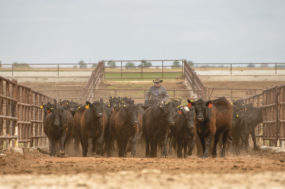Higher grain prices have led to more expensive food this year. Products such as cereal, soft drinks and meats are all affected by higher grain prices. The recent corn acreage report by the U.S. Department of Agriculture should calm both inflation fears and higher-trending grain prices, said Dr. Mark Welch, AgriLife Extension grains marketing economist in College Station.
“The recent price action (after the published report) in corn and wheat will ease food inflation concerns to the extent they ever caused them to go up in the first place, which is relatively small,” Welch said.
“Moderating crude oil prices probably will have more of an impact. But, I think the Federal Reserve is right in that core inflation, excluding food and energy, is not a problem right now and even these two categories should not keep going up at the rate they were.”
Corn storage inventory is 3.67 billion bushels, higher than the range of reported analysts’ estimates and above “the average guess” of 300 million bushels, Welch said.
“Again, this report indicates we will have larger ending stocks at the end of the current marketing year than previously thought, all else equal,” Welch said.
This would ease fears of a shortage later this year, he noted.
Meanwhile, global economic events have also weighed in on the grain markets, Welch said.
“Outside markets have been calmed by progress in Europe on the Greek debt crisis. Greek lawmakers have passed legislation that makes the budgetary cuts necessary to secure emergency short-term loans from international lenders,” Welch said.
“These loans will provide the means for Greece to pay its bills for the next three months. This is the first step in the negotiations between the Greek government and the European financial community to restructure its debt for the long term.”
In Welch’s weekly grain report, he notes the euro is stronger relative to the dollar “on renewed confidence in economic growth stemming from the situation in Greece and anticipation that the European Central Bank will raise interest rates next week in response to inflation concerns.”
“Weakness in the dollar is also attributed to continued concerns over the U.S. economy and debt situation," Welch said. “The slow pace of U.S. job growth is dampening prospects of economic recovery while Congress and the President continue to battle over the U.S. budget limit.” ![]()







